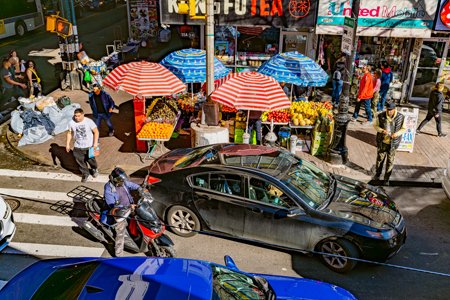Catherine Orrok: "A Geometric Inquiry"
May 2 - June 2, 2024
Opening Reception: Saturday, May 4, 2024, 4 - 6 pm
Zoom Artist Talk: Sunday, May 19, 4:40 pm. Register HERE
Opening our new spring season on May 2, 440 Gallery is pleased to present A Geometric Inquiry, a solo show of acrylic paintings on canvas, birch panels and paper by Catherine Orrok. Geometric abstraction becomes a geometry softened by the handmade aspect of the work. This is not a hard-edged geometry, but one that reflects the process of painting with evident brush marks and occasional drips of paint. This is Orrok’s first solo show at the gallery.
Orrok's approach begins with the grid but purposefully disrupts its natural order. The use of color blocks provides a dynamic foundation on the canvas. By deliberately applying highly visible brushwork in some blocks and solid colors in others, Orrok adds complexity to the composition. The juxtaposition of these diverse surfaces highlights the inherent nature of paint as a medium. As the shapes traverse from the background to the foreground, Orrok skillfully captures a sense of time through the painting’s layers. The contrast of the deep Prussian blue lines contributes to the illusion of depth by outlining new spaces on top of an already manipulated grid.
By celebrating the edge and space around the canvas, Orrok draws attention to the boundaries of the image and its interactions with the surroundings. This approach reflects an intentional consideration of the relationship between the artwork and its environment, encouraging viewers to engage with the piece on multiple levels and appreciate the intersection of form and space.
Addressing her process, Orrok says, "In my painting, I am trying to build space intuitively, so I must be open to what my senses are telling me rather than what my intellect says should happen."
Catherine Orrok was born and raised in New Jersey and received her BA in Art from Fairleigh Dickinson University. In 1982, she received her MFA from Hunter College. Orrok was represented by Yvonne Rapp Gallery in Louisville, Kentucky, until 1996. Additionally, her work was shown at Hunter College Gallery and the Clinton Art Museum in Clinton, New Jersey. More recently, she has exhibited work at SJC Brooklyn Arts Council, the Catskill Arts Space and Albany Center Gallery, as well as several shows in the Project Space at 440 Gallery.
“Mind’s Eye”: Acey, Bendheim, Stock
Jo-Ann Acey, Fred Bendheim, and David Stock are sharing the Project Space in a show titled Mind’s Eye. We all have the ability to visualize images in our mind, and from that fertile ground, art can easily grow. Are these creations fragments from memories, moments of recognition that resonate with the artist, or perhaps mental pictures that start the creative process? In Mind’s Eye, Acey, Bendheim, and Stock make use of their visual imagination to create images beyond ordinary sight.
Jo-Ann Acey is showing work from her series The Journey Home. Created with Flashe paint and mixed media on paper or wood panel these pieces evoke movement and memory as indicated in their title. Acey states, “The works are created as visual diaries of remembered places.” The abstract images take form through the artist’s multifaceted visualization of a particular place - maybe real, maybe imagined. Through her use of color, movement, and a spontaneous process, Acey brings these complicated elements together, revealing the journey home.
For Fred Bendheim, inspiration comes from both the natural world and the human domain, be it from principles of nature or human culture. His painted shapes span the boundaries between painting and sculpture, figuration and abstraction, and personal expression and site-specific art. Bendheim’s work explores the relationship between forms and colors. It is a spiritual quest to express something larger than himself. Bendheim refers to his art as “a living tree with many branches”. He states, “My art is a creation-tree that I cultivate daily, and it also cultivates me and others.”
David Stock’s photographs are penetrating observations of the urban environment, yet they embody very personal thoughts and feelings. Stock and other photographers sometimes refer to this duality as “equivalence”. As photographer John Paul Caponigro explains, “Through equivalence the photographic object created becomes a reflection of both the external things it represents and the internal states of its creator. This reflective capacity is extended to the viewers, who re-experience this shared process in their own ways.” Stock remarks that his images of complex street scenes “grow out of my engagement with the city, and evoke for me a host of memories and associations”.




